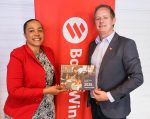AfriTin CEO, Anthony Viljoen has said that having previously announced that the terms of their proposed N$100 million lending facility with the Development Bank of Namibia had expired at the end of July 2022; the Company has now extended the terms such that completion is anticipated around the end of September 2022.
AfriTin entered into a conditional, credit approved, term sheet for a lending facility with the DBN to fund the Uis Phase 1 Stage II continuous improvement project.
As the company announced on 5 July 2022, a proposed lending facility comprising a N$100 million (approximately £5.5 million) Senior Secured Lending Facility has been signed with the Development Bank of Namibia.
“Although the Lending Facility has been approved by the credit committee and board of the Development Bank of Namibia, there are certain conditions precedent that need to be adhered to, including the completion of the final legal documentation.
“At this stage there can be no guarantee the Lending Facility will be entered into, or that any money will be drawn down, but AfriTin Management have every confidence that it will be,” Viljoen said last week adding that a further update will be provided at that time.
Meanwhile, AfriTin’s performance for the financial year ended February 28 was one of strong operational delivery, which has resulted in the company considerably increasing production from the Uis mine, in Namibia, and generating its first group-wide profit.
“Our production at Uis has exceeded nameplate capacity by 12%, which is a testament to the operational excellence we have instilled in Namibia and puts the company in a good position to deliver our forthcoming further expansion initiatives,” Viljoen highlights.
Revenue for the period was £13.6-million (about N$270 million), up 178% year-on-year, driven by increased production and higher tin prices.
AfriTin recorded a maiden group profit before tax of £400 000 (About N$7.9 million), compared with a loss of £5.8-million in 2021.
There was also an increase in earnings before interest, taxes, depreciation and amortisation of 155% to £2.6-million.
“Despite volatile global commodity markets this year, management and the board of directors remain confident that the market fundamentals for tin production will remain positive, giving AfriTin’s existing operations a relative competitive advantage in this supply-constrained environment.
“The addition of various growth initiatives, specifically the addition of lithium and tantalum production revenue streams, will further drive future value for the company. This should transition AfriTin to a multi-commodity producing technology metals group, which is tremendously exciting,” Viljoen says.
Speaking of the Uis project, Viljoen noted that the Phase 1 pilot plant at Uis has performed strongly and provided a perfect platform to propel AfriTin from a single commodity producer to a multi-tech metal Company over the next five years.
“Production at our flagship asset exceeded nameplate capacity with an annual production of 804 tonnes of tin concentrate. A Definitive Feasibility Study for the expansion of the Phase 1 mining and processing facility was published during the year which served as confirmation of the highly attractive economics associated with the low-cost modular expansion of the current Phase 1 plant. The Phase 1 expansion project is currently in progress and is estimated to increase tin concentrate production by 67% by way of a modular expansion of the existing processing facility. The bulk of the civil construction and steel fabrication has been completed, with on-site steel construction currently in progress,” he said.
He went on to say that in line with their vision of diversification of their techmetal exposure through by-product production, raising equity funds of £13 million before expenses has put the Company in a position to expedite the Phase 1 expansion and further investigate lithium and tantalum by-product potential and exploration.
“By-product production as well as the introduction of ore sorting technology, which upgrades feed to the concentrator by up to four times the ROM grade, could transform the overall economics and unit cost of production for Phase 1. The Company is proceeding with the design and procurement of a pilot lithium beneficiation facility as well as the implementation of a tantalum concentrating circuit and ore sorting test circuit. By implementing the pilot phase development of these additional products, the Company aims to take advantage of the burgeoning technology metals market by fast-tracking the by-product streams into production.
“Turning to Phase 2, the results of the Phase 2 Preliminary Economic Assessment (PEA) were announced during the year and demonstrated the economics and returns for the expansion. Phase 2 should see AfriTin produce globally significant volumes of tin, lithium, and tantalum, which the Directors believe are vital in meeting the demands of the transition to a new efficient and greener technology future,” added Viljoen.










